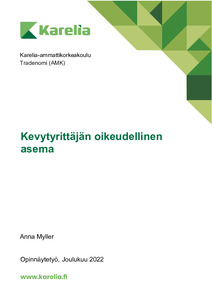Kevytyrittäjän oikeudellinen asema
Myller, Anna (2022)
Myller, Anna
2022
All rights reserved. This publication is copyrighted. You may download, display and print it for Your own personal use. Commercial use is prohibited.
Julkaisun pysyvä osoite on
https://urn.fi/URN:NBN:fi:amk-2022112423916
https://urn.fi/URN:NBN:fi:amk-2022112423916
Tiivistelmä
Opinnäytetyön tehtävänä oli selvittää kevytyrittäjän oikeudellinen asema työelämässä ja selventää kevytyrittäjyyden määritelmää. Lisäksi tutkittiin kevytyrittäjänä toimimisen mahdollisuutta ilman laskutuspalvelun käyttöä ja sitä, kenelle kevytyrittäjyys sopii. Tavoitteena oli koota selkeää tietoa aiheesta kevytyrittäjyyden aloittamista harkitseville sekä Suomen tilitoimistoyrittäjille, joita aihe tulee koskemaan työelämän muutosten takia.
Opinnäytetyön teoriaperustana käytettiin Suomen lainsäädäntöä, valtion veroviraston ja työeläkevakuutusyhtiön verkkosivustoja sekä tiedeyhteisöjen julkaisuja ja lehtiartikkeleita. Tutkimus toteutettiin kvalitatiivisena tutkimuksena. Tutkimusmenetelmänä käytettiin haastattelua, joka toteutettiin puolistrukturoituna yksilöhaastatteluna puhelimitse. Haastateltavana toimi Verojelppi Oy:n verosiantuntija Heikki Rintala. Haastattelun avulla haluttiin selvittää laskutuspalvelun käytön välttämättömyyttä kevytyrittäjälle. Teoriaperustan ja aineiston sisällönanalyysin avulla vastattiin asetettuihin tutkimuskysymyksiin.
Kevytyrittäjyyden määritelmä ei ole yksinkertainen, sillä tulosten mukaan kevytyrittäjää voidaan pitää henkilönä työntekijän ja yrittäjän välillä. Kevytyrittäjä toimii yrittäjämäisesti laskuttaen työtään laskutuspalvelun kautta. Verotuksellisesti kevytyrittäjä todettiin palkansaajaksi, mutta eläke- ja sosiaaliturvan puolesta kuitenkin yrittäjäksi. Kevytyrittäjyyden todettiin sopivan sivutoimiseksi tulonlähteeksi palveluiden ja omavalmisteisten tuotteiden myyntiin. Haastattelussa kävi ilmi, ettei palveluiden laskuttaminen ilman laskutuspalvelua ole mahdollista. Laskutuspalvelun tehtävä on tarjota yksityishenkilöille mahdollisuus laskuttaa yrityksiä ja yksityishenkilöitä myydyistä palveluista ja tuotteista. The thesis aimed at investing the juridical status and clarify the definition of a light entrepreneur. The thesis also researched if working as a light entrepreneur is possible without using an invoicing service and whom the light entrepreneurship is suitable for. The information on these matters is gathered mainly for those who are considering light entrepreneurship but also for Finnish accounting companies who are dealing with the changes in the world of work.
Various public information resources were used to create the theoretical base for this thesis. The study was qualitative. The research method was a semi-structured individual interview, and it was conducted on the phone. The interviewee was a tax specialist Heikki Rintala from Verojelppi Oy. The purpose of the interview was to examine the necessity of using an invoicing service for a light entrepreneur. The research questions were answered by conducting content analysis of the gathered material.
The results of the study proved that the definition of the light entrepreneur is complex, and the light entrepreneur can be considered to be in between an employee and an entrepreneur. The light entrepreneur works like an entrepreneur, invoicing the completed work assignments through an invoicing service. The tax office defines them as wage earners, but in terms of pension and social security they are seen as entrepreneurs. In this study light entrepreneurship was found to be suitable source of side income for those who want to sell services and self-made products. The interview showed that invoicing of services is not possible without an invoicing service, which offers private persons the opportunity to invoice companies and individuals for the sold services and products.
Opinnäytetyön teoriaperustana käytettiin Suomen lainsäädäntöä, valtion veroviraston ja työeläkevakuutusyhtiön verkkosivustoja sekä tiedeyhteisöjen julkaisuja ja lehtiartikkeleita. Tutkimus toteutettiin kvalitatiivisena tutkimuksena. Tutkimusmenetelmänä käytettiin haastattelua, joka toteutettiin puolistrukturoituna yksilöhaastatteluna puhelimitse. Haastateltavana toimi Verojelppi Oy:n verosiantuntija Heikki Rintala. Haastattelun avulla haluttiin selvittää laskutuspalvelun käytön välttämättömyyttä kevytyrittäjälle. Teoriaperustan ja aineiston sisällönanalyysin avulla vastattiin asetettuihin tutkimuskysymyksiin.
Kevytyrittäjyyden määritelmä ei ole yksinkertainen, sillä tulosten mukaan kevytyrittäjää voidaan pitää henkilönä työntekijän ja yrittäjän välillä. Kevytyrittäjä toimii yrittäjämäisesti laskuttaen työtään laskutuspalvelun kautta. Verotuksellisesti kevytyrittäjä todettiin palkansaajaksi, mutta eläke- ja sosiaaliturvan puolesta kuitenkin yrittäjäksi. Kevytyrittäjyyden todettiin sopivan sivutoimiseksi tulonlähteeksi palveluiden ja omavalmisteisten tuotteiden myyntiin. Haastattelussa kävi ilmi, ettei palveluiden laskuttaminen ilman laskutuspalvelua ole mahdollista. Laskutuspalvelun tehtävä on tarjota yksityishenkilöille mahdollisuus laskuttaa yrityksiä ja yksityishenkilöitä myydyistä palveluista ja tuotteista.
Various public information resources were used to create the theoretical base for this thesis. The study was qualitative. The research method was a semi-structured individual interview, and it was conducted on the phone. The interviewee was a tax specialist Heikki Rintala from Verojelppi Oy. The purpose of the interview was to examine the necessity of using an invoicing service for a light entrepreneur. The research questions were answered by conducting content analysis of the gathered material.
The results of the study proved that the definition of the light entrepreneur is complex, and the light entrepreneur can be considered to be in between an employee and an entrepreneur. The light entrepreneur works like an entrepreneur, invoicing the completed work assignments through an invoicing service. The tax office defines them as wage earners, but in terms of pension and social security they are seen as entrepreneurs. In this study light entrepreneurship was found to be suitable source of side income for those who want to sell services and self-made products. The interview showed that invoicing of services is not possible without an invoicing service, which offers private persons the opportunity to invoice companies and individuals for the sold services and products.
